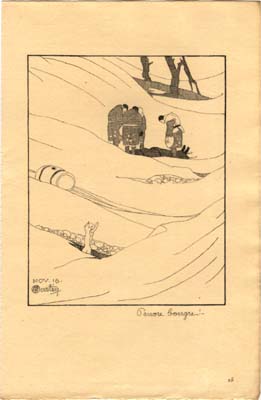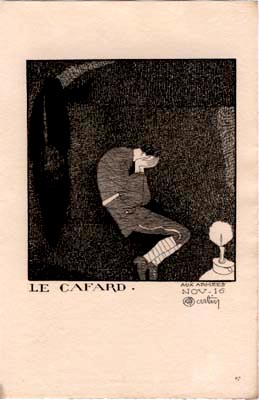units
conclusions
image banks
--l'assiette au beurre
--Les Quatre Saisons de la Kultur
 |
 |
From: A Very Long Engagement
The second man's number was 4077, issued at a different recruiting
office in the department of the Seine. He still wore the tag bearing this
number beneath his shirt, but everything else, all badges and insignia,
even the pockets of his jacket and overcoat, had been torn off, as they
had been from his companions' clothing. He had slipped while entering the
trenches and been soaked through, chilled to the bone, but perhaps this
was a blessing in disguise, for the cold had numbed the pain in his left
arm, pain that had kept him from sleeping for several days. The cold had
also dulled his mind, which had grown sluggish with fear; he could not
even imagine what their destination might be, and longed only for an end
to this bad dream.
Before the nightmare he'd been a corporal, because they'd needed
one and the fellows in his platoon had chosen him, but he hated military
ranks. He was certain that one day all men, including welders, would be
free and equal among themselves. He was a welder in Bagneux, near Paris,
with a wife, two daughters, and marvelous phrases in his head, phrases
learned by heart, that spoke of the workingman throughout the world, that
said . . . For more than thirty years he'd known perfectly well what they
said, and his father, who'd so often told him about the Paris Commune,
had known this, too.
It was in their blood. His father had had it from his father,
and had passed it on to his son, who had always known that the poor manufacture
the engines of their own destruction, but it's the rich who sell them.
He'd tried to talk about this in the billets, in the barns, in the village
cafés, when the proprietress lights the kerosene lamps and the policeman
pleads with you to go home, you're all good folks, so let's be reasonable
now, it's time to go home. He wasn't a good speaker, he didn't explain
things well. And they lived in such destitution, these poor people, and
the light in their eyes was so dimmed by alcohol, the boon companion of
poverty, that he'd felt even more helpless to reach them.
A few days before Christmas, as he was going up the line, he'd
heard a rumor about what some soldiers had done. So he'd loaded his gun
and shot himself in the left hand, quickly, without looking, without giving
himself time to think about it, simply to be with them. In that classroom
where they'd sentenced him, there had been twenty-eight men who'd all done
the same thing. He was glad, yes, glad and almost proud that there had
been twenty-eight of them. Even if he would never live to see it, since
the sun was setting for the last time, he knew that a day would come when
the French, the Germans, the Russiansó"and even the clergy"ówould refuse
to fight, ever again, for anything. Well, that's what he believed. He had
those very pale blue eyes flecked with tiny red dots that welders sometimes
have.
Sébastien Japrisot